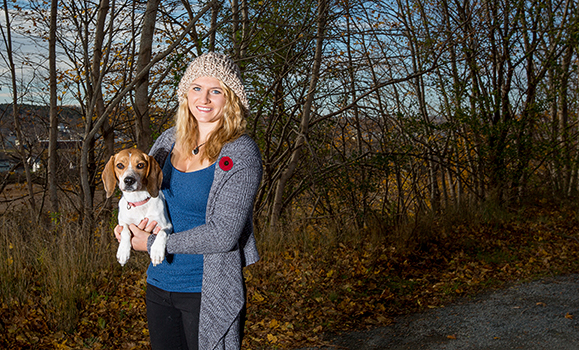Whitney Shaver and her beagle, Jinger, are inseparable. So when Whitney came to the Faculty of Agriculture nearly four years ago to study Animal Science, Jinger came too.
“When I moved into town and had to live with roommates during my first year at Dal AC, I realized I needed to give Jinger more structure and training, which brought me to Yan Mowatt at Little Moe’s K-9 Academy,” she explains.
Whitney began by taking a basic obedience class using Operant Conditioning Behaviour Analysis (OCBA), which involves using positive training with the use of clickers to achieve desired behaviours. Yan Mowatt, an expert in this technique, has used OCBA to put many national and international championship and obedience titles on her dogs. Now, Whitney helps train service dogs to work with veterans and others in need of support.
“I worked very hard and absorbed every bit of knowledge I could from Yan," says Whitney. "At the end of our obedience class she believed I was talented and provided me with the opportunity to increase my knowledge with another trainer that had a lot of experience with service dogs."
“Whitney is good with dogs and with people which is a great combination,” says Yah. “Whitney is not afraid to challenge herself and dog training takes a lot of consistency and patience.”
Training to support veterans and others
Whitney began her specific service dog training in January this year and has gained a large amount of experience training many different breeds and ages of dogs while employed at Little Moe’s K-9 Academy over the past year.
“Working at Little Moe’s has really given me the opportunity to apply my knowledge and training to so many different situations and dog behaviours,” she added.
Whitney trains service dogs in an effort to help people with Autism, diabetic alert, seizure alert, cerebral palsy, movement disorders and Post Traumatic Stress Disorder (PTSD) in veterans.
“Service dogs can help veterans in many ways and has been described by veterans as ‘gaining their life back’,” Whitney explains.
A service dog provides veterans with a companion they can trust and that can help them. For example, a service dog will alert its handler when they become uncomfortable and can provide them with signals to leave an area to help avoid any panic or added stress. A service dog assumes a position called “cover me” (which is the dog standing directly behind the handler and leaning slightly against the back of their legs so the handler feels contact) to provide the handler with a sense of protection and enable them to feel comfortable when they are required to turn their back in a public place, which can often be very difficult for people with PTSD.

A service dog also provides their handler comfort in any situation, at home or in public and helps to calm them as well as remind them to stay relaxed. With time, a very well-trained dog that develops a strong bond with their handler can also help to alert a nightmare before it becomes a night terror.
“Whitney has shown dedication and talent working with all different breeds here at Little Moe’s K9 Academy,” added Yan. “I know Whitney has worked on and off training service dogs which will eventually go to help veterans or others with PTSD. It takes a very dedicated person to work with training service dogs of any sort, loving the work just makes it all even better.”
“My great grandfather fought in the war so that is who I will be honouring on Remembrance Day on Wednesday,” says Whitney. “My grandfather did not fight directly as he was exempt for being a farmer, but he also played an important role in providing food to the men at war so I will also be honouring him.”
Canines on campus
Whitney can typically be seen attending classes on the Agricultural Campus with her service dog-in-training, exposing them to daily situations.
“I have had a dog in-training on campus with me, attending classes and becoming exposed to daily situations,” explained Whitney. “Although I am not currently training a service dog, any dog that is far enough along in training to gain public access is with their trainer 24/7. This will advance their training as well as ensure they are able to a handle all situations when they are placed with their handler.
Whitney is currently in her last year of an Animal Science Degree and is completing a Certificate of Specialization in Organic Agriculture.
“I currently plan on returning to my hometown of Port Burwell Ontario and starting my own business,” she says. “I plan to start a small business by initially training service dogs as well as general obedience classes and private lessons for problem dog solving
“My goal is to grow my business into horseback riding camps as my first passion was horses. I have many years of horse training experience as well as coaching. I am also planning to use my Specialization in Organic Agriculture to transition my family farm to organics and set it up as demo/educational farm for others and provide educational tours for tourist and school groups.”
For more information about service dogs and Whitney’s training please contact her by email at whitney.p.s@hotmail.com

